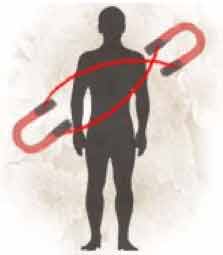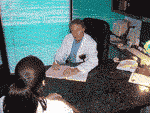Magnet Therapy
 For many years magnets have been touted for their health benefits. The central portion of hemoglobin in our red blood cells, which carry oxygen to our tissues, is iron. It is thought that by attracting the red blood cells to the point of application, the blood flow (perfusion) to the area is increased, thereby assisting with healing. Magnets have been used in orthotics (shoe inserts) for many years, which serves as an adjunct to the support of the arches of the foot and stabilization of the pelvis. According to new research from the University Of Virginia it has been shown that magnets significantly reduce the swelling of tissues, much like an ice pack would. (Study Summary). In that study, when magnets were applied to acutely injured tissues it was shown that this reduced the swelling. (You may find other useful information at the website of the Integrative Medicine Program at the University Of Virginia, Dr. Rekars alma mater.)
For many years magnets have been touted for their health benefits. The central portion of hemoglobin in our red blood cells, which carry oxygen to our tissues, is iron. It is thought that by attracting the red blood cells to the point of application, the blood flow (perfusion) to the area is increased, thereby assisting with healing. Magnets have been used in orthotics (shoe inserts) for many years, which serves as an adjunct to the support of the arches of the foot and stabilization of the pelvis. According to new research from the University Of Virginia it has been shown that magnets significantly reduce the swelling of tissues, much like an ice pack would. (Study Summary). In that study, when magnets were applied to acutely injured tissues it was shown that this reduced the swelling. (You may find other useful information at the website of the Integrative Medicine Program at the University Of Virginia, Dr. Rekars alma mater.)
Recently a grant from the National Institute of Health's National Center For Complementary And Alternative Medicine was given to biomedical engineering professor Thomas Skalak to investigate the evidence of magnetic therapy. People have been using magnets to treat conditions from arthritis to depression. Professor Skalak's study was published in the November issue of the American Journal Of Physiology.
More exciting news came from an article written in the Journal Of The American Medical Association on April 13, 2005, which suggests that brain stimulation using magnets may have the potential as a therapy for psychiatric and neurological conditions, including depression, Alzheimer's disease and Huntington's disease. One technique is transcranial magnetic stimulation (TMS) which is felt to turn on and off particular parts of the brain. TMS was developed in the 1980's. Unlike such techniques as electroconvulsive therapy, TMS does not require anesthesia or implanting devices in the brain. It is easy to apply, non-invasive, and doesn't hurt. A magnetic coil housed in a paddle is applied to the scalp. It produces a magnetic field that induces small electrical currents within the brain. It's effects can either excite or suppress neurons. TMS fields do not penetrate into the brain. Initially the effect rarely lasted longer than thirty minutes. Newer techniques have produced rapid, consistent and controllable changes lasting much longer.
TMS has also been used to study neuronal circuitry, speech and learning. The excitatory effects of TMS build up within a second, while the inhibitory effect takes several seconds. Currently there are many studies underway which are investigating the usefulness of TMS in a variety of conditions including insomnia, dystonia, cerebral palsy, schizophrenia, stroke, Parkinson's disease, smoking cessation, autism, bipolar disorder, fibromyalgia, migraine headaches, obsessive-compulsive disorder, post-partum depression, post-traumatic stress syndrome, and those aforementioned. In an article in Newsweek of December 2006 it was reported that 45 percent of patients involved in such a study for severe depression experienced relief of at least half their symptoms. Thirty-one percent of those patients experienced relief of virtually all of their depressive symptoms after nine weeks of treatment. Down the road it is speculated that TMS devices will be created, allowing patients to self-manage depression from their own homes. It should be noted that certain patients are not good candidates secondary to underlying health conditions, such as patients with metal implants in their heads, pregnant women, patients who have previously suffered a stroke, patients who are prone to seizures or who have a history of seizures, or have undergone neurosurgery. As future developments become available we will continue to update this information with emerging science.
Addendum:
As recently reported in the Internal Medicine News of December 15th, 2008:
"The Food And Drug Administration has cleared a noninvasive device that delivers magnetic stimulation to the brain for treating depression in adults, according to Neuronetics Inc., the manufacturer of the device."
"The FDA cleared the NeuroStar TMS (Transcranial Magnetic Stimulation) Therapy System for treatment of major depressive disorder in adults who have failed to achieve satisfactory improvement from one prior antidepressant medication, used at or above the minimal effective dose and duration during the current episode, the company said in a statement."
Best in Health,
David M. Rekar, M.D.
Medical Director
[Above Image Thanks To The Spine Shoppe]
Universal City Medical Wellness Group (UCMWG) is a Multidisciplinary & Complementary Alternative Medical Group with an M.D. and Chiropractors, located near Universal Studios, Studio City, Hollywood, North Hollywood, Burbank & Toluca Lake, in L.A.
We Specialize In:
We are providers for:
- Blue Cross - Blue Shield - United Health - AFTRA - Medicare - SAG - Motion Picture Health and Welfare - Aetna -
Most PPO's Accepted








